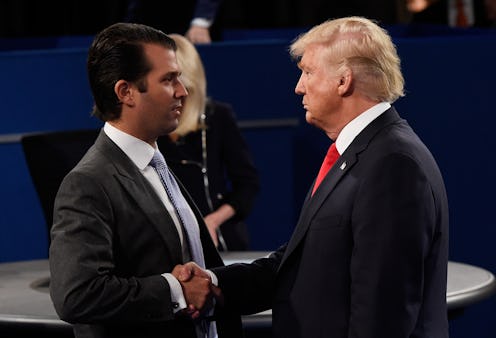News
Did Donald Jr. Commit Treason With His Emails? Trump's Russia Troubles Continue

Legal experts are divided on whether Donald Trump Jr. committed treason after the email chain revelation of his correspondence with Rob Goldstone on Tuesday. But at least one lawmaker, Sen. Tim Kaine, is throwing around the word "treason" in remarks about Trump Jr.'s agreement to meet with a Russian lawyer after being told he would get "incriminating" information on Hillary Clinton.
“This is treason. He must have known that the only way Russia would get such information was by spying,” Richard Painter, who served as ethics lawyer under President George W. Bush, tweeted. “In the Bush Administration we would have had him in custody for questioning by now," he added.
The debate about Trump Jr's actions come after the New York Times broke a story on Monday that claimed that in 2016, amid the nomination process, Donald Trump Jr. had met with a Kremlin-linked lawyer whom the president's son thought had incriminating evidence against Democratic candidate Hillary Clinton.
The Russian lawyer, Natalia Veselnitskaya, denied that they spoke about the campaign or that she was representing the Russian government. Trump Jr., however, released an email chain with Goldstone, the publicist who set the meeting up, which substantiated the Times's claim that Trump Jr. was under the impression he would be getting dirt on Clinton.
On the topic of treason, CNN legal analyst Jeffrey Toobin felt differently. "I think treason is ridiculous, and I don't think there's any possibility that this is treason," he told CNN. Others suggested that Trump Jr.'s actions probably broke the law, but did not go so far as to call it treason. “The law states that no person shall knowingly solicit or accept from a foreign national any contribution to a campaign of an item of value,” said Ryan Goodman, a former Defense Department special counsel, according to Vox. “There is now a clear case that Donald Trump Jr. has met all the elements of the law, which is a criminally enforced federal statute.”
Treason is defined, according to Cornell Law's Legal Information Institute, thus: "Whoever, owing allegiance to the United States, levies war against them or adheres to their enemies, giving them aid and comfort within the United States or elsewhere, is guilty of treason and shall suffer death, or shall be imprisoned not less than five years and fined under this title but not less than $10,000; and shall be incapable of holding any office under the United States."
“Let’s cut through the baloney here. We know what the Russians have been doing,” Richard W. Painter, George W. Bush's ethics lawyer, said on MSNBC. “When the Russians call or someone calls on behalf of the Russians and offers derogatory information about a former secretary of state who is a presidential candidate, the first person you call is the FBI.”